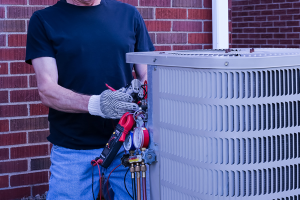
19 May, 2020
HVAC systems can be intimidating. There are so many different parts, sizes and types. Plus, each type has its own benefits and drawbacks. If you or your business is considering installing an HVAC unit in your building, it is worth exploring the different options that are available.
Wondering, “what kind of HVAC system to get?” or not sure what types of AC units are out there? Let's clear up the confusion!
There are four main HVAC types. Each of these AC and heating systems has pros and cons, and knowing these aspects can help you decide which is best for your home or office. We've outlined the four HVAC system types you need to know about below.
The split system is the most popular residential HVAC system. It has one component outside and one inside. You can configure these systems in numerous ways depending on your climate.
On the positive side, they are the most reasonably priced heating and air conditioning units, especially for replacement systems. You can install new components with little to no alterations to your home’s existing ductwork to help minimize the chance of needings a furnace repair.
But on the flip side, traditional split systems require ductwork, so they are impractical where adding ductwork is too expensive or impossible.
A hybrid split system is gaining popularity because of its ability to reduce energy costs through its electric hybrid heating system, which distinguishes it from other HVAC system types.
You can switch from gas power—which is quicker—to electric, which is more efficient and silent. This allows users to determine how they want to heat their home or office.
This type of AC and heating unit is more useful in mild climates where electric heat will do just fine. This system uses traditional ducts and thermostats, and provides all the benefits of a split system. Plus, it helps conserve energy and reduce utility bills.
These pros are balanced by the fact that these systems cost more than their conventional counterparts. Plus, to protect the investment you've made in your heating system, you have to perform the manufacturer's recommended preventive maintenance, regularly changing your filters and taking care of your system and its main components.
Ductless split systems include an external air conditioner for cooling only or a heat pump for cooling and heating. There’s no furnace. The indoor module has a fan for diffusing treated air and can be installed on walls, the ceiling, or the floor.
Ductless split systems are ideal for a home or office with no existing ductwork. One outside unit can provide treated air to up to 5 indoor units, and each unit can be regulated with its own thermostat for precise, zoned climate control.
However, they aren’t suitable for very cold climates and they don’t offer the range of options you get with traditional split systems.
A packaged system is manufactured with all the main components in one large cabinet. They are more commonly used in homes without basements, and are always installed outdoors. Every packaged system contains a blower to force treated air into the home and draw untreated air into the system.
Packaged systems are a popular choice because they don’t create much noise inside the home as all the mechanical components are placed outside.
That being said, they don’t offer as many options as standard and ductless split systems, and they are far less efficient. As all the components are outdoor, they tend to wear out faster than other HVAC systems.
A ductless split system is an economical alternative to the traditional split system, especially if you’re converting a garage or basement into your living space. However, if split systems aren’t an option, then you may consider package systems.
While the cost of the technology is coming down, hybrid systems are still quite expensive compared to traditional split and ductless split systems. But if you plan to stay in your home for 10+ years, then it’s worth the investment.
Still not sure which of the different HVAC system types is right for your home or office? Talk to our expert Fargo HVAC technicians. At Valley Service, we’ll help you choose the best heating and cooling solution to meet your needs. Call us today at 701-293-5701!